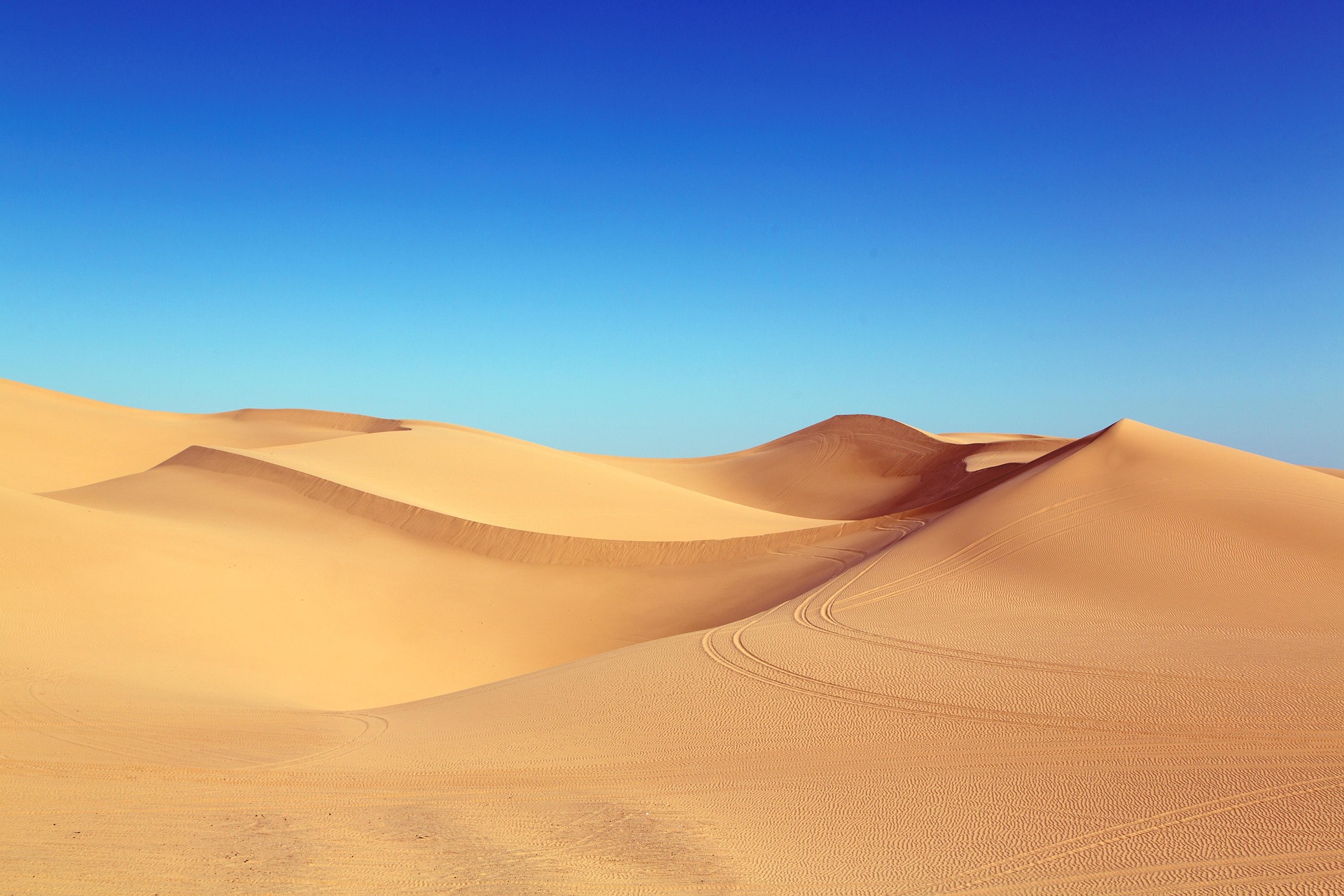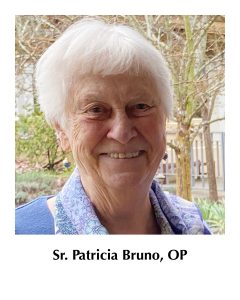- All
- Wisdom
- We Stand on Their Shoulders
- Vocation
- Uncategorized
- Stories Seldom Heard
- Spirituality
- Social Justice
- Prayer
- Peace
- Oneness
- Love
- Letting Go
- Lent
- Joy
- Inspirational Images
- Hope / Healing
- Holy Week
- Gratefulness
- God's Presence
- General News Stories
- Forgiveness
- Finding God
- Faith
- Easter
- Dominican Saints
- Discipleship
- Courage
- Christmas
- Catholic Sisters Week
- Care of the Earth
- Blessing
- Beauty
- Advent
- #justiceOPportunity
A Desert Lenten Reflection
Sr. Patricia Bruno, OP

284th Edition
March 2023: A Desert Lenten Reflection
The world turns and the world changes,
But one thing does not change.
In all of my years, one thing does not change.
However you disguise it, this thing does not change:
The perpetual struggle of Good and Evil.
Forgetful, you neglect your shrines and churches;
The men you are in these times deride
What has been done of good. You find explanations
To satisfy the rational and enlightened mind.
Second, you neglect and belittle the desert.
The desert is not remote in southern tropics.
The desert is not only around the corner.
The desert is squeezed in the tube-train next to you,
The desert is in the heart of your brother. (1)
 The Israelites were a nomadic desert people who struggled not only to remain free from alien tribes, but also to survive the harsh, extreme conditions of their environment. Beginning with the second chapter of Genesis we become increasingly aware of the precariousness of desert life. A pivotal story in the First Testament is the Israelites’ forty-year desert sojourn. It’s a story that accentuates the physical hardships they had to endure. It is marked by cries for water, food and protection. It is also filled with emotional and spiritual growth.
The Israelites were a nomadic desert people who struggled not only to remain free from alien tribes, but also to survive the harsh, extreme conditions of their environment. Beginning with the second chapter of Genesis we become increasingly aware of the precariousness of desert life. A pivotal story in the First Testament is the Israelites’ forty-year desert sojourn. It’s a story that accentuates the physical hardships they had to endure. It is marked by cries for water, food and protection. It is also filled with emotional and spiritual growth.
In the New Testament, the desert scene shifts a little. Even though most of Jesus’ life takes place near the Sea of Galilee and in the region of Judea and Jerusalem, the desert plays a significant role in Jesus’ life. The desert terrain is still easily accessible, but the desert for Jesus carries multiple levels of meaning. A desert is a geographical place, as well as a place of mystery. It is a place where spirits of every kind are free to take up residency. It is also the training ground for prophets. So it is no surprise that early in Matthew’s Gospel, we hear that Jesus is led by the Spirit into the desert. Matthew carefully crafts his story. He wants to be sure we understand that the Spirit of God led Jesus into the desert, stayed with him, guided his thoughts, and sustained him in his trials.
As we begin to focus our attention on Lent, we are reminded that we, like Jesus, are led into the desert by the Spirit. “The desert waits, ready for those who come obedient to the Spirit’s leading; or who are driven because they will not come any other way” (2). The desert waits ready to let us know who we are. It is a place of self-discovery. Like the parched and dry sand in the desert that shifts with the wind, uncovering ancient artifacts, we too can rediscover past experiences buried shallow and deep in our memories. In the heat of the day and with the cool setting sun, the vast landscape of our memories stirs our imaginations. Shadows lengthen and inanimate figures–rocks and shrubs–begin to walk and play according to the sun’s movement as the day darkens and draws to a close. The dramatic landscape of the desert is complex, but it is also a good place to begin our Lenten meditation and prayers.
We don’t need to leave our homes or travel to the Mojave Desert. Laura Swan in her book The Forgotten Desert Mothers shares the wisdom of the great Desert Ammas–women who went to the desert to live solitary lives of fasting and prayer. But after many years and much discernment, they decided to move back to the cities. They had come to a new realization. The cities had become spiritual deserts. Also, they understood that the real journey was not to some deserted place, but an inner journey characterized by Christ’s vision and inner freedom. So in the midst of city life, they continued to offer their wisdom and guidance. Following their wisdom, our quiet desert space can be in our homes, our gardens, or an out-of-the-way park bench. For each of us it will be different. But for all of us it will be a place where we can set aside our usual distractions in order to pay attention to what is most important and central in our lives.
Finding the appropriate place for prayer and solitude is important, but it might not be our first step. Perhaps the first step for us, as it was with those long ago, is to believe that even short periods of silence and quiet reflection each day have value and can change our hearts.
I asked a friend who is ninety-six years old, in good health, and has a memory better than mine, what she was doing for Lent. Her usual Christian practices even when it is not Lent are robust. She prays the scriptures and the rosary each day. Once a week she visits friends who are ill or in nursing homes. She financially supports groups that work with the poor. However, this Lent she and a friend have decided to drive to the river that passes through their town and spend 20 minutes in prayer each day. “This,” she said, “would be different than my morning prayer. We are going to the river to silently observe nature and see what nature tells us about God and our lives.”
Lent offers us the space to slow down, to be introspective and more focused. It is a time to seek self-knowledge and to refocus our lives so that we can be the people of integrity and compassion we desire to be. This involves the hard honest work of meeting ourselves just as we are and accepting ourselves just as we are. Accepting ourselves includes recognizing areas that need to be changed. It involves taking a truthful inventory of who we are.
A few years ago, a man I know was having some marital problems. After some conversations he read the book, Wherever You Go, There You Are. It’s a book that examines how we often think that another city, another job, another way of life, or a different relationship would change our lives. It is also the book that helped him face some of the areas of his life that needed attention. Lent can be a welcomed guest when we realize that we are being led by the same Spirit who led Jesus into the desert. It is that Spirit who gives us the courage to examine our lives in the light of God’s desires for us. We know we can do this because we are confident that God’s mercy and grace walk with us each step of the way.
Still thinking about your Lenten Practice? A suggestion: Read Pope Francis’ The Name of God is Mercy and/or The Joy of the Gospel.
Footnotes
1. The Complete Poems and Plays 1909 – 1950, T. S. Eliot, Choruses from “The Rock”, Harcourt, Brace and Company, NY, 1930. p. 98
2. Ruth Burgess, “Desert Experience in the Time of Testing,” The Resurrection of Peace, by Mary C. Grey, SPEC, London, 2012.
